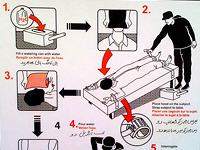BOB GARFIELD: Last Sunday, Alicia Shepard, NPR’s Ombudsman, published a blog post that explored the reasoning behind NPR News’ use of the term “enhanced” or “harsh interrogation techniques” rather than the word “torture” to describe the interrogation tactic known as waterboarding. The current administration has declared that waterboarding is torture. Former President George Bush and Vice President Dick Cheney continue to deny that. Shepard says that calling waterboarding torture is tantamount to taking sides.
ALICIA SHEPARD: Torture is illegal, so I think the media gets caught up in trying to figure out how to use this. And so, the one point I hope I made strongly was just stop characterizing things, just describe what they are.
BOB GARFIELD: I should point out that as Ombudsman, your job is to be the link between the audience and the NPR News Department. You aren't a mouthpiece for management. But, in this case, you do seem to be sympathetic and supportive of the NPR policy, no?
ALICIA SHEPARD: I would say that I am sympathetic and supportive for good solid journalism. And as I noted in the post, we've been getting a lot of emails from people who would prefer that NPR uses the word “torture.” So I felt they had built up, and I felt that it was time to deal with this.
BOB GARFIELD: The U.N.’s High Commissioner for Human Rights says that waterboarding is torture. The International Committee of the Red Cross have called what the U.S. did “torture.” Waterboarding is unambiguously in violation of the International Convention on Torture, which has been ratified by 140-some countries. It seems to me that the only people who think it’s a debate are the Bush Administration, who are the culprits. So how does that constituent a debate?
ALICIA SHEPARD: Well, there are two sides to the issue. And I'm not sure, why is it so important to call something torture? You know, when you describe the technique, I think that sounds like torture to me. Isn't it the job of the news media to put the facts out there, to give as much detailed information and to put it in context?
BOB GARFIELD: I put it to you that embracing a euphemism for torture validates a political position. You’re trying to be apolitical but, in fact, to embrace terms like “harsh interrogation tactics” instead of calling a thing by its name, in effect, gives credence to the Bush Administration’s argument, does it not?
ALICIA SHEPARD: Yes, I think it does. I think using terms like “harsh interrogation tactics” or “enhanced interrogation techniques” does validate the Bush Administration. So that’s why I said why not just describe it. I think when you detail something and explain specifically what it is, then the public can decide.
BOB GARFIELD: NPR certainly has no difficulty calling murder “murder.” It doesn't call it “enhanced argumentation technique.” The terrorists call themselves “freedom fighters” but NPR calls acts of terror “acts of terror.”
ALICIA SHEPARD: Right.
BOB GARFIELD: In other respects, NPR hasn't taken a position against, you know, nouns. Why this one, in particular?
ALICIA SHEPARD: I think because it is a hotly debated topic. Isn't that why any news organization is studying it, analyzing it, trying to figure out what’s the right thing to do? I get emails from people who say, why doesn't NPR call a doctor who performs abortions a terrorist? Our language in general is totally evaluative and loaded with meaning, and so whatever someone uses, if someone else disagrees with it, then that language is wrong. So, embedded in NPR’s policy, it does say that we may refer to specific techniques, such as waterboarding, and note that the President and the Attorney General have said that waterboarding is torture. So, NPR does not have a “never use the word ‘torture’” in their arsenal.
BOB GARFIELD: All right. So obviously, I have a point of view on this, and you have given us NPR’s point of view. Is there anything else you want to say before we close this discussion?
ALICIA SHEPARD: If I were asked personally whether or not pouring water down someone’s nose and throat for 20 seconds constitutes torture, I would say personally that I think that it does. I totally understand, though, that a news organization needs to be as neutral as possible, and putting out the facts and letting the audience decide whether something is good or bad, right or wrong. And so in my opinion, as somebody with almost 30 years of journalism experience, it’s not the role of the media to take on characterizing things.
BOB GARFIELD: Fair enough. Thank you, as always.
ALICIA SHEPARD: Glad to be here. Thanks, Bob.
BOB GARFIELD: Alicia Shepard is the Ombudsman for NPR.
